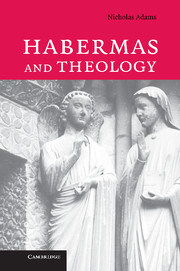Book contents
- Frontmatter
- Contents
- Preface
- 1 Religion in public
- 2 The ideal speech situation
- 3 Authority and distance in tradition
- 4 Sacred and profane
- 5 Universalism
- 6 Theology and political theory
- 7 Theology, social theory and rationalisation
- 8 Modernity's triumph over theology
- 9 Habermas in dialogue with theologians
- 10 Narrative and argument
- 11 Scriptural difference and scriptural reasoning
- List of references
- Index
7 - Theology, social theory and rationalisation
Published online by Cambridge University Press: 23 December 2009
- Frontmatter
- Contents
- Preface
- 1 Religion in public
- 2 The ideal speech situation
- 3 Authority and distance in tradition
- 4 Sacred and profane
- 5 Universalism
- 6 Theology and political theory
- 7 Theology, social theory and rationalisation
- 8 Modernity's triumph over theology
- 9 Habermas in dialogue with theologians
- 10 Narrative and argument
- 11 Scriptural difference and scriptural reasoning
- List of references
- Index
Summary
Is religious thought inherently ‘mythic’? There are two principal theological answers to this question. The first makes a separation between ‘myth’ and ‘rational discourse’, and suggests that the mythic inheritance needs to be rationalised in order to be intelligible and persuasive to modern religious people. The second suggests that even the most rarefied rationalised discourses are still importantly ‘mythic’, in that they narrate a description of the world whose bases cannot be secured by theory: religious thinking is mythic because all thinking is mythic. Habermas is interested in this question, and he tends to take the first route. For theologians who take the second, therefore, it is interesting to know how separations between myth and reason are made by Habermas, and to evaluate how persuasively he executes this.
The contrast in ‘Some Characteristics of the Mythical and the Modern Ways of Understanding the World’ (Habermas 1984a: 43–74) is between the rational and the non-rational. Our task is to find out whether theology is inherently sub-rational in Habermas' account.
Habermas' description of mythic societies draws on the work of Lévi-Strauss, Evans-Pritchard, Maurice Godelier, Peter Winch, Steven Lukes, Alasdair MacIntyre, Robin Horton and Jean Piaget. Habermas has been heavily criticised from a number of angles. I intend to focus on the question of testing. That means paying attention not so much to how validity claims are raised and defended as to how they are placed in question: the mechanics of this process.
- Type
- Chapter
- Information
- Habermas and Theology , pp. 124 - 153Publisher: Cambridge University PressPrint publication year: 2006

